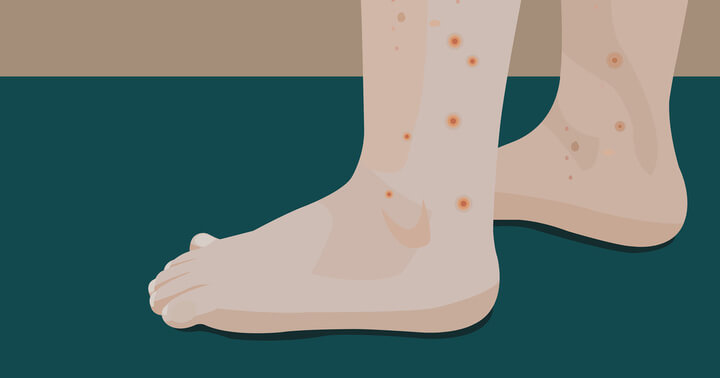Has it ever occurred to you that a trivial mosquito bite could cause you your life? While we stand together in our fight against COVID-19, another public health issue has been silently creeping up.
With over 361 cumulative cases of dengue fever being reported in the first two weeks of 2021, the dengue virus has proven itself to be equally worrying. Read on to learn more about the disease, dengue hotspots and ways to better protect yourself and your family.
What is dengue fever and where does the dengue virus come from?
Dengue fever is a disease caused by the dengue virus, which is transmitted to humans via the saliva of a female Aedes mosquito. Aedes mosquitos are infected with the virus after it has bitten someone who has dengue fever in their blood stream.
If you’re wondering if dengue can be spread through breathing, here’s the good news:
Dengue cannot be directly spread from one person to another. The disease tends to occur between 4 to 7 days after a victim is bitten by an infected Aedes mosquito. Time to be more mindful of stagnant water in/near your home!
What are the warning signs of dengue?
Sometimes, it can be difficult to decipher if it’s common ailments or symptoms of dengue fever. Do seek medical consultation whenever you feel unwell. Meanwhile, here are some warning signs of dengue:
- A sudden fever
- A severe headache
- Joint and muscle aches
- Skin rash
- Nausea and vomiting
- Mild bleeding in the nose or gum
Unfortunately, first-time dengue infections can be severe, especially among the elderly and those with pre-existing medical conditions. Repeat dengue infections have also been associated with a higher occurrence of severe dengue, which might lead to dengue haemorrhagic fever or dengue shock.
#TiqOurWord In the unfortunate event that you are diagnosed with dengue fever, you are eligible to get a diagnosis cash benefit of S$3,000 if you are protected with ePROTECT safety. Learn more here.
Where are the dengue hotspots in Singapore?
According to NEA, a dengue cluster (aka dengue hotspot) is a location where two or more dengue cases have happened within 14 days and are located within 150m apart.
Today, the largest hotspot is at Tampines Pl, with a total of 157 infections. With that said, you should exercise more caution if you are working or residing in a hotspot. NEA identifies and provides a live island-wide update for high-risk dengue hotspot areas. Check here if you live in a dengue cluster.
The construction industry also plays an important role in our fight against dengue. Construction sites are of particular concern as they can easily become the breeding grounds for Aedes mosquitos. While there are extra measures taken within the construction industry, if you stay near construction sites or happen to visit one, do take extra precaution.
So, is it common to get dengue fever in Singapore?
Unfortunately, dengue fever has become prevalent in Singapore. This could be due to the tropical climate that Singapore experiences, which leads to accelerated breeding and maturity of the Aedes mosquito.
But fret not, all hope is not lost even if your estate happens to be in one of the dengue hotspots. Here are some guidelines on how to stay safe from dengue, especially with the upcoming Lunar New Year where homes and other premises are decorated with ornamental plants:
- Keep your insecticide at hand and regularly spray in dark corners of your home.
- Use mosquito repellent regularly if you stay in a dengue cluster.
- Try to wear long sleeves and long pants, whenever possible.
- Turn pails and watering cans over and store them under shelter.
- Remove water in plant pot plates, and clean the plate thoroughly to remove mosquito eggs. Remember to ensure there’s no stagnant water.
- Change water in flower vases daily. Clean and scrub the inner sides of vases. Wash roots of flowers and plants thoroughly as mosquito eggs can stick to them easily.
- Check your home and surroundings for potential mosquito breeding spots and if help is required, contact NEA.
Final thoughts on dengue fever
Do not brush it off the next time you feel that tingling itch because that seemingly harmless itch could potentially lead to an onset of dengue fever. Take the extra step to protect your family and yourself today with ePROTECT safety, a personal accident insurance from Tiq by Etiqa, for round-the-clock worldwide coverage at a monthly renewable subscription rate from just S$ 18 per month.
For a limited time only, your protection will also be further enhanced with our complimentary special coverage for COVID-19 and Dengue Fever. Learn more here.
[End]
Information is accurate as at 4 February 2021. This policy is underwritten by Etiqa Insurance Pte. Ltd. (Company Reg. No. 201331905K). Protected up to specified limits by SDIC. You should seek advice from a qualified adviser before deciding to purchase the policy. If you choose not to seek advice, you should consider if the policy is suitable for you. It is usually detrimental to replace an existing personal accident plan with a new one. A penalty may be imposed for early termination and the new plan may cost more or have less benefit at the same cost. Benefits of the policy will only be payable upon an accident occurring.
Tiq by Etiqa Insurance Pte. Ltd.
A digital insurance channel that embraces changes to provide simple and convenient protection, Tiq’s mission is to make insurance transparent and accessible, inspiring you today to be prepared for life’s surprises and inevitabilities, while empowering you to “Live Unlimited” and take control of your tomorrow.
With a shared vision to change the paradigm of insurance and reshape customer experience, Etiqa created the strong foundation for Tiq. Because life never stops changing, Etiqa never stops progressing. A licensed life and general insurance company registered in the Republic of Singapore and regulated by the Monetary Authority of Singapore, Etiqa is governed by the Insurance Act and has been providing insurance solutions since 1961. It is 69% owned by Maybank, Southeast Asia’s fourth largest banking group, with more than 22 million customers in 20 countries; and 31% owned by Ageas, an international insurance group with 33 million customers across 16 countries.
Discover the full range of Tiq online insurance plans here.








